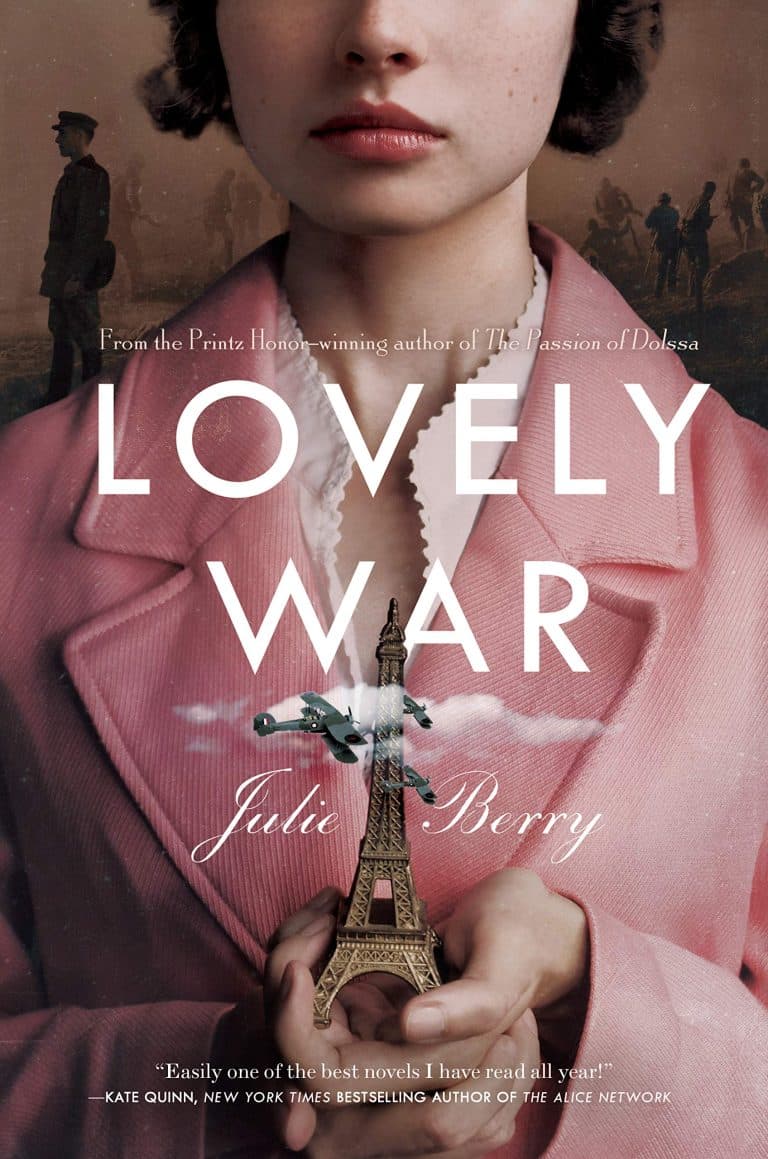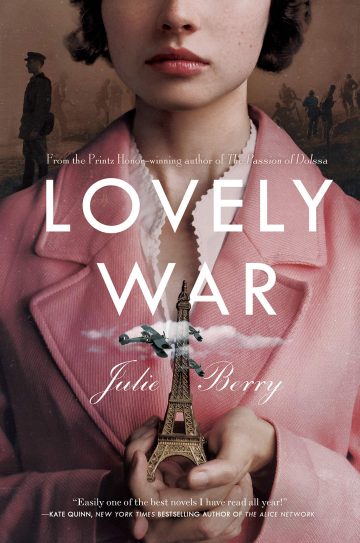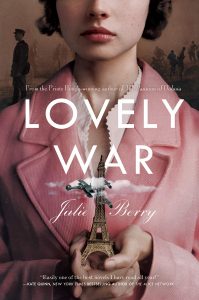Library services for youth is my stock-in-trade, and while I love playing matchmaker with books and young readers, there’s also a special thrill when I find a young adult book with strong crossover appeal for adults. Julie Berry’s Lovely War is just that: a soaring story of the love and aspirations of young people, set amidst the horrors of World War I. It’s got the emotional immediacy that appeals to young readers, paired with the deep-dive historical details that adults lap up like cream.
As the Horn Book summarizes it:
When the Greek god of fire, Hephaestus, catches his wife Aphrodite, goddess of love, in 1942 Manhattan in a passionate affair with his brother Ares, god of war, Aphrodite defends her actions by showing the two gods what real love looks like. With pathos and wit, Aphrodite relates two intertwined love stories involving four mortals swept up in World War I. Eighteen-year-old Hazel Windicott meets nineteen-year-old James Alderidge when she’s playing piano at a parish dance in her London neighborhood a week before he’s set to report for military service in France. And it’s Hazel who introduces the other couple to each other: YMCA relief worker Colette Fournier, a Belgian orphan whose family was killed by the Germans, and ragtime/jazz musician Aubrey Edwards, an African American doughboy from Harlem. The four humans suffer great losses throughout the course of this saga, driving home Aphrodite’s eloquent point that everyone, human and god alike, is entitled to love and be loved, no matter his or her imperfections. Berry showcases her masterful storytelling ability . . .[s]he doesn’t shrink from addressing heavy-hitting and still-pertinent topics: racism, the horrors of war, women’s subjugated role in society. This poignant novel will make readers, by turns, laugh, cry, and swoon, but what Aphrodite offers most is hope: “Let them start their dreadful wars, let destruction rain down, and let plague sweep through, but I will still be here, doing my work, holding humankind together with love like this.”
In other words, this is catnip for almost all the readers I know. If you’re looking for a blind date with a book this Valentine’s Day, pick this one up; you won’t be disappointed.
In addition to starred reviews from pretty much every book critic around, Lovely War had the well-deserved fortune to be awarded the 2020 Golden Kite Award, which is bestowed by the Society of Children’s Book Writers & Illustrators. To celebrate the book’s shiny new sticker, the Exponent blog gave me the opportunity to ask Julie a few questions about Lovely War, and writing in general.
One of the most distinctive features of Lovely War is its framing device — that this is a World War I story as told by the gods of the Greek pantheon, particularly Aphrodite. Why did you decide to structure the story this way?
I knew I wanted to write a WWI love story, but none of my attempts worked until I decided upon this means of storytelling. I realized at the outset that point of view was going to be my great challenge with this project. A romantic story demands a close, intimate point of view that can report on the lovers’ every thought and feeling. A war story, by contrast, demands a panoramic, epic view that can take in broad swathes of time and space, and large casts of characters. I struggled to reconcile the two into one coherent point of view. Then I thought, what if love, personified, and war, personified, were my narrators? Immediately it hit me that we already have love, personified, and war, personified, and they’re already secret lovers. Hot diggety. It was too good to pass up.
I loved all four of the different narratives we see through this story, but what really reeled me in was that of Aubrey Edwards, the fictional Black American musician who fought in the war as part of the real-life U.S. Army’s jazz band. I admit I knew next to nothing about Black soldiers during WWI, and especially not the Army-sponsored jazz bands. How did you stumble across this little-known part of history? What drew you toward it?
When I first set out to research World War I, I visited libraries and searched for historical narratives about the war. It was almost uncanny how often books about and mentions of the Harlem Hellfighters popped up. At first my focus was on European soldiers, so I passed over these references, but the relentlessness with which they appeared on my research radar finally made me take a closer look. Once I did, I knew the story of segregated African American army divisions needed to be part of the novel. I didn’t want to be complicit in producing yet another narrative of white heroism in a time of war without confronting the stain of violence and hatred upon the soul of white supremacist America.
Was it challenging to write a narrative from the perspective of a Black character?
I view the story of the Harlem Hellfighters as sacred territory, and their sacrifices and losses in the face of America’s violence and hatred as hallowed historical ground. Nothing less than my utmost effort would be worthy of such material. Even so, my utmost effort couldn’t be, in itself, enough. I can’t fully know what I don’t know, and I’ve never been Black, male, subject to racism, or a thousand other things that make up someone like Aubrey’s lived experiences, so I relied heavily on the input of several authenticity consultants who read the manuscript and gave crucial input.
I don’t believe the challenge of writing a character from a culture, race, or group other than your own is any harder than it’s ever been, not if your intention is to do it thoughtfully and well. What’s different now is that members of the groups depicted have a better-functioning megaphone, and more of the book world’s attention, in holding creators accountable for their words and their impact. This, appropriately, forces every artist to better their craft, to be more thorough in their research, and to be more disciplined in questioning their assumptions.
Were you ever concerned about finding a balance between the love stories vs. the realistic horrors of WWI?
The choice to use the gods as narrators was motivated by that very concern you’ve mentioned, about the balance between love stories and battle scenes. World War I was such a bleak, hideous monstrosity that I doubt it could be romanticized. At least, I didn’t feel I was doing so. In those parts of the novel, I felt I was writing a horror show.
When I write, I don’t think much about age-level questions or concerns. I try to tell the truth of an experience, to the best of my ability. I trust that if something needs adjustment, we can catch it in the revision phase. My general mode, though, is to place confidence in my readers and assume they’re ready to handle hard subjects. It helps that I’m writing books, not movies. Readers will paint their own pictures in their minds, which allows them to see only what they’re ready to see.
How do you manage to balance writing time with everything-else-in-life time?
Ugh. I don’t. My desk runneth over, as does my bureau, laundry hamper, junk drawer, closet, car… Every day feels like a scramble to try to fit in even a handful of the things that matter: family, fitness, friends, fun, devotions, service, piano, and work. Work happens nearly every day, and yet it never feels like sufficient progress; if I can touch two or three of the other things, I have to call it good enough. But I own it; this is a conscious choice I’m making, opting for a full, if hectic, life, rather than a calmer, more orderly one.
Do you have any advice for aspiring women writers?
Nobody else will fight to make this happen if you don’t, so give yourself permission to be a little bit fierce about claiming some time and resources for your writing life and progress. You deserve it; you need it; you matter as much as everyone else under your roof matters. (Fierce can still be diplomatic, and a team player, but fierce doesn’t tolerate needless martyrdom.)
Give yourself permission to write badly, to fail at first. It will take time to develop your voice and your skills. If your early efforts aren’t inspiring, it doesn’t mean you lack talent. We instinctively understand that it takes time to learn to walk, swim, ride a bike, and shoot a hoop, and we encourage our children to keep on trying, because we know they’ll get there if they persist. Then we write our first short story, realize it’s pretty weak, and decide we “don’t have it,” we were wrong when we thought we could be writers. I don’t even know where to start with that.
Beyond that: 1. Read all you can. 2. Write as often as you can. 3. Commit to the process of learning how to write better, to whatever extent you can. Find mentors. Read books on craft. But the best teachers will be steps 1 and 2.
Brooke Shirts is a retired youth services librarian and recent ly finished her tenure as the chair of the Puget Sound Council for the Review of Children’s & Young Adult Literature. She nearly began drooling on her laptop when she was given the chance to interview Julie, and thanks her mightily for her time!





2 Responses
Excellent interview! Thanks, Brooke. I’ve heard great things about the book from others as well, and I’m excited to read it.
I, too, am a youth librarian and LOVED this book! Enough that I recommended it to my mom and sister and adult friends.
And how fun to have had the opportunity for this interview — thanks for sharing it.